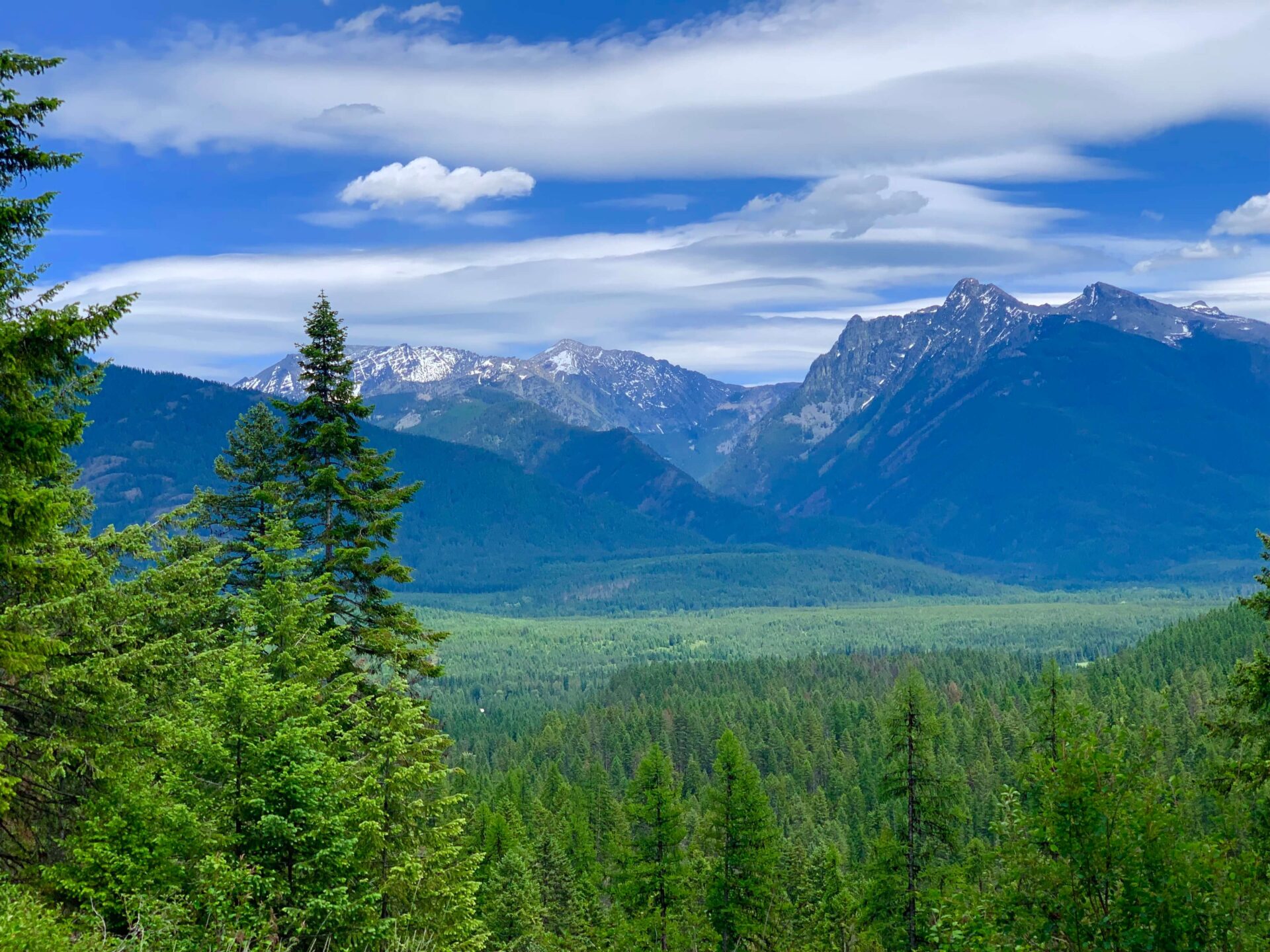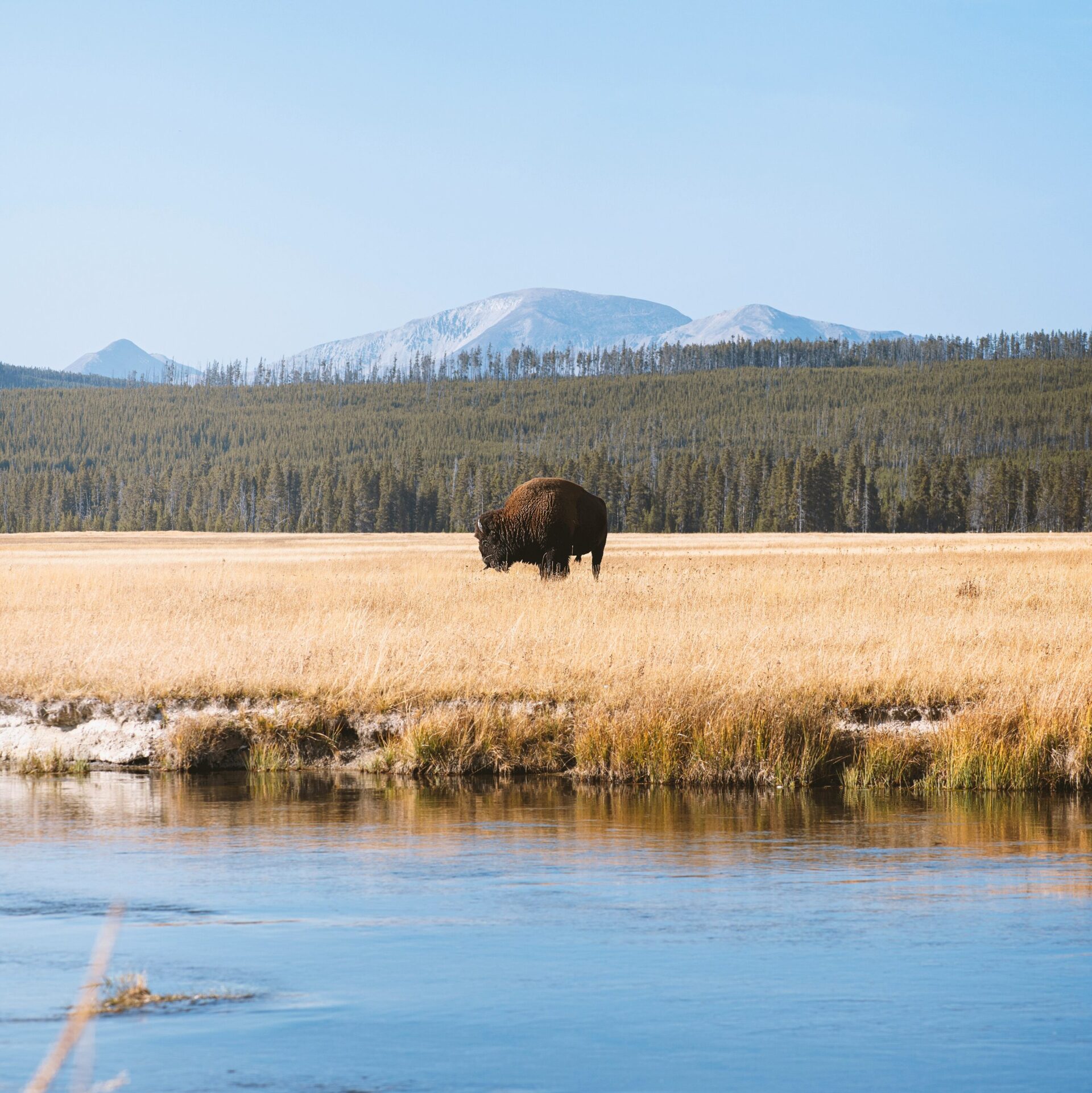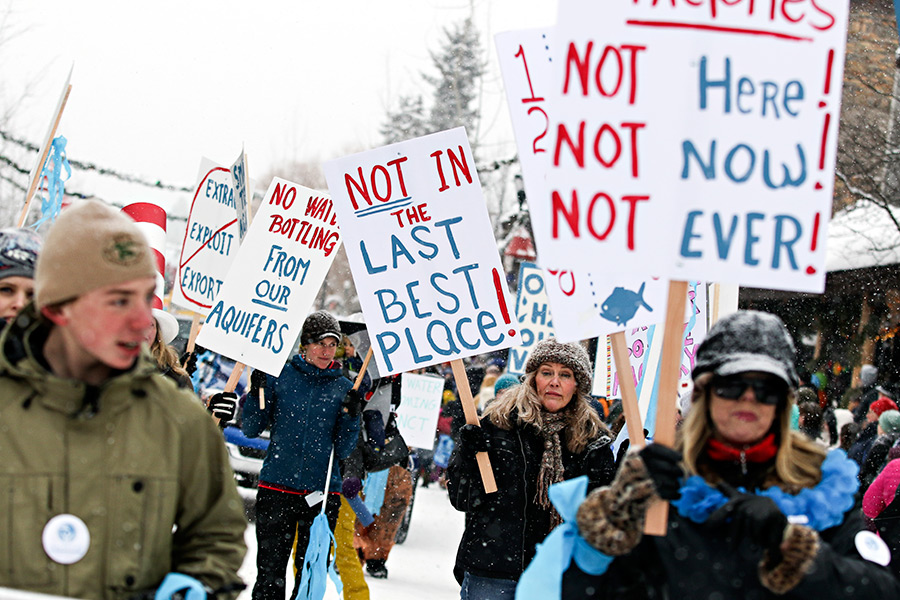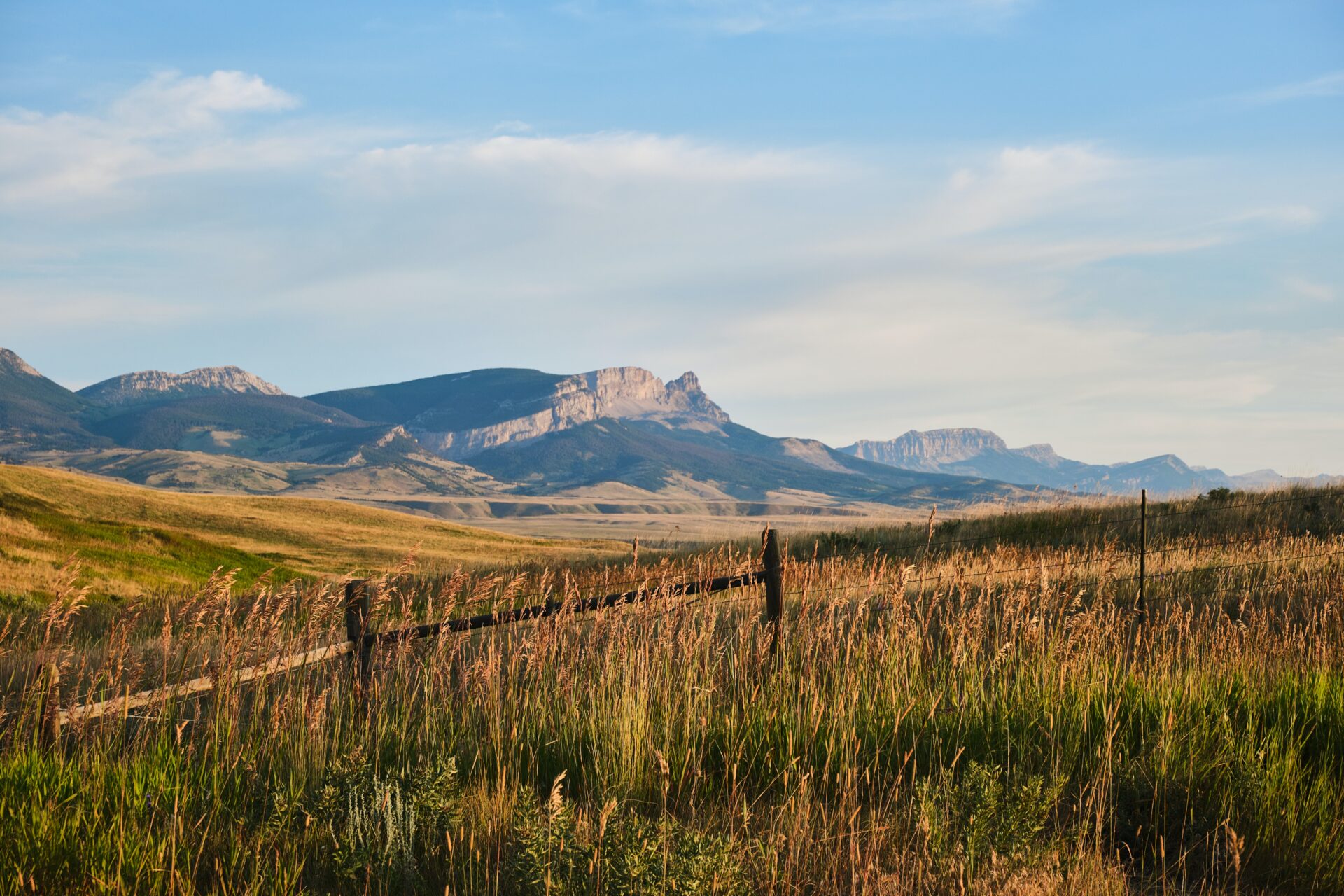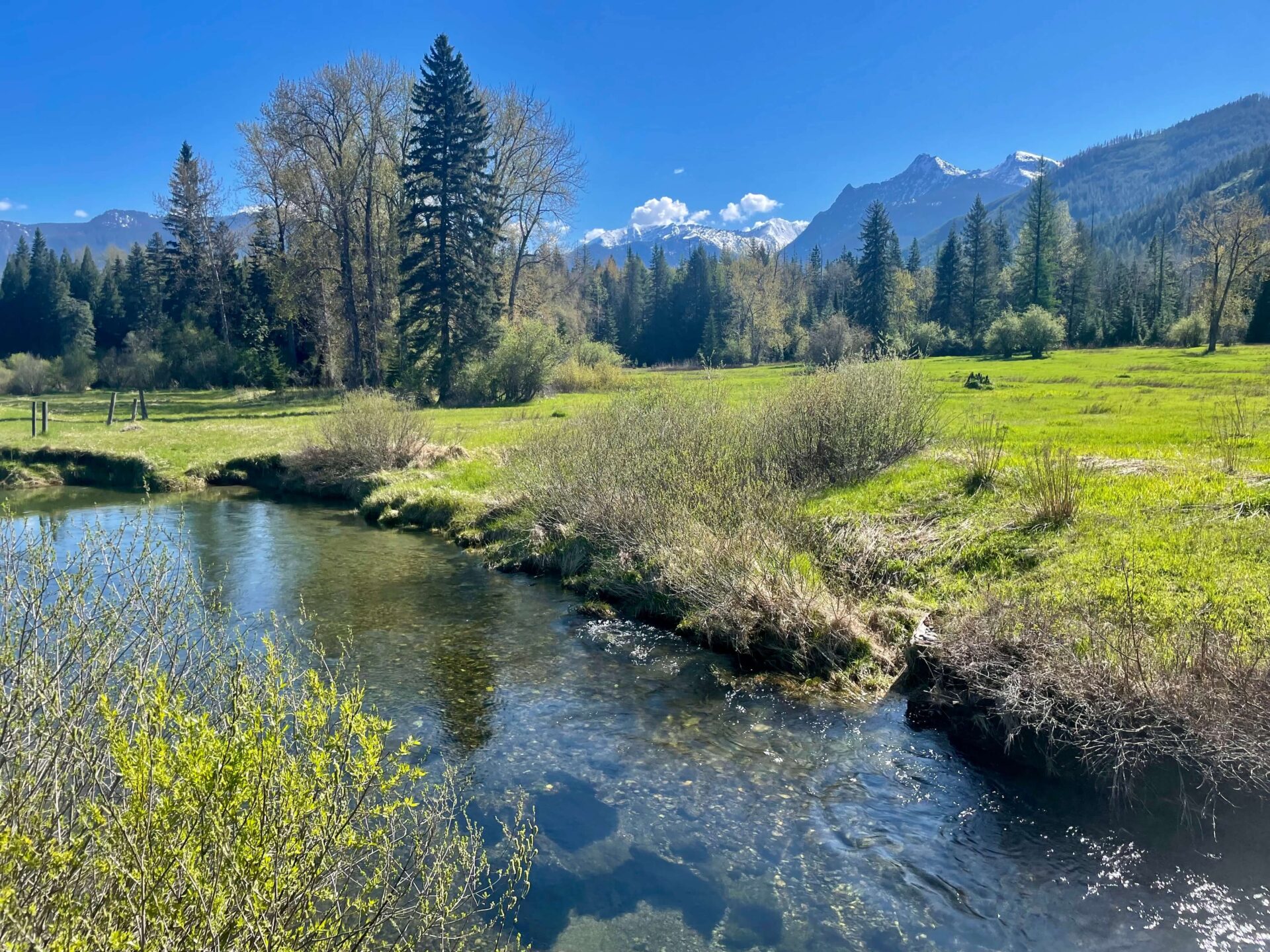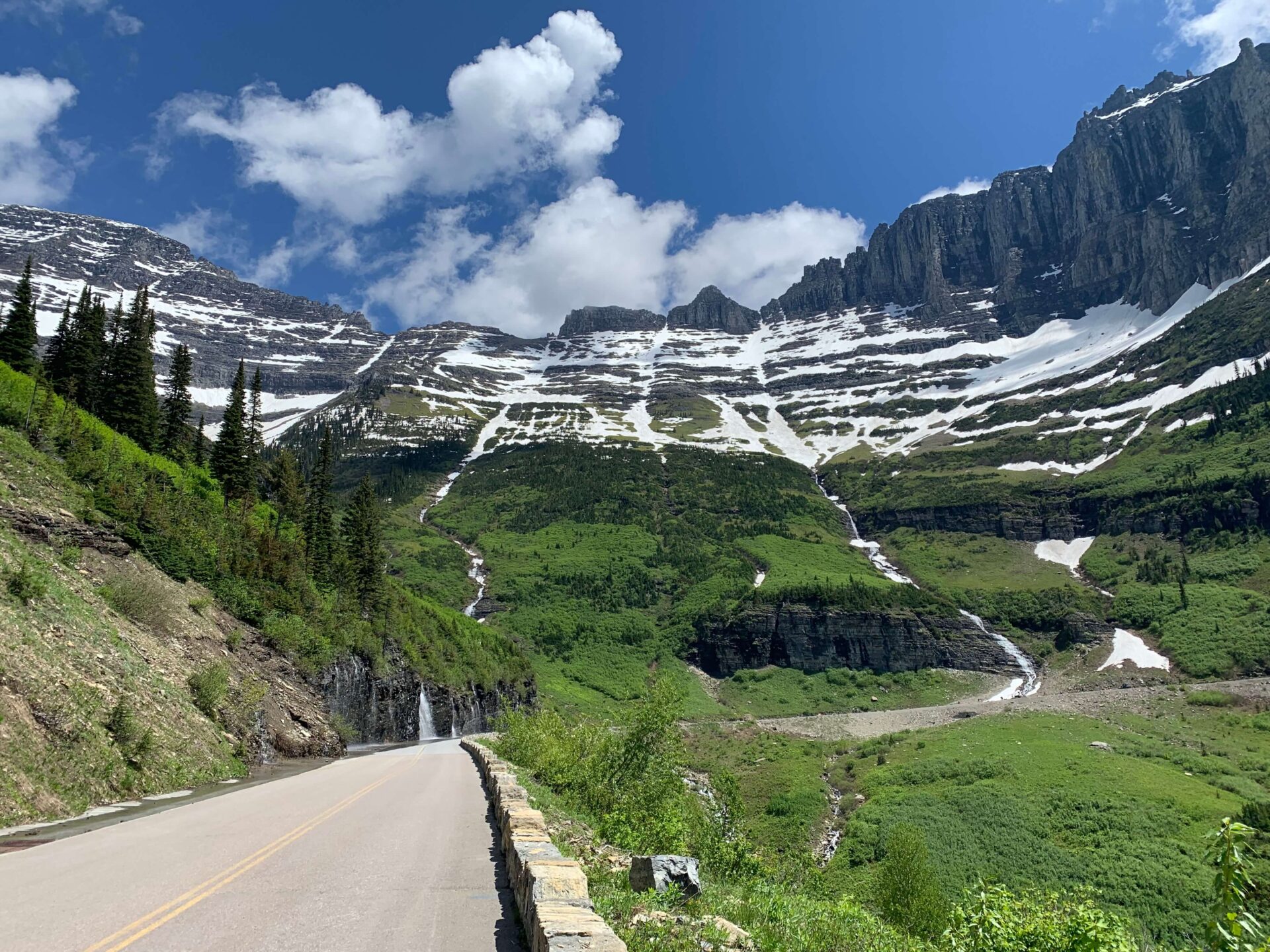Local water commissioner says a ‘shakedown’ is coming for Crazy Mountain Ranch this summer
by Amanda Eggert 06.18.2025
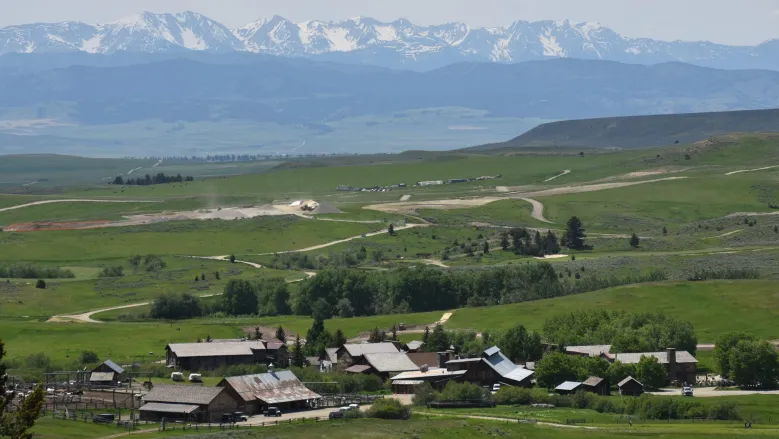
In 2021, a subsidiary of the company that owns the Yellowstone Club purchased Crazy Mountain Ranch, an 18,000-acre guest ranch located in the Shields River Valley of Park County. Credit: Amanda Eggert / MTFP
CLYDE PARK — Tim Sundling remembers when he first heard developers discuss plans for a golf course in Shields Valley, an agricultural area below the Crazy Mountains that’s resisted the real estate boom consuming glitzy, amenity-rich communities across the county line.
Sundling, who raises cattle on land his great-grandparents ranched, casually followed the rumors that surrounded the future of Crazy Mountain Ranch after a subsidiary of the company that owns the ultra-exclusive Yellowstone Club bought the property in 2021. Like his neighbors, Sundling wondered if elements of the Yellowstone Club, where actors and professional athletes ski and golf alongside some of the world’s wealthiest people, would infiltrate Park County.

Tim Sundling is a Shields Valley cattle rancher frustrated with Crazy Mountain Ranch’s subversion of laws designed to protect other water users. Credit: Amanda Eggert / MTFP
“The community just swirls with rumors ever since they bought it, about what’s going to happen. And there’s really no way to substantiate it,” Sundling said in a recent interview with Montana Free Press where he recalled a May 2024 meeting Crazy Mountain Ranch hosted on its property. “Some of the farmers and ranchers were very anxious to go because they’re just so curious what’s going to happen.
“They told us, ‘[it’s] going to stay a ranch, it’ll have no community impact, blah, blah, blah. We’ll maybe plan on building a golf course, [but] it’ll never be like the Yellowstone Club. … In retrospect, it was just propaganda to keep us quiet.”
Within five months of that meeting, crews were driving in truckloads of sod for the golf course greens to Crazy Mountain Ranch, an 18,000-acre property known locally as the Marlboro Ranch when it was a guest ranch owned by tobacco giant Philip Morris. Employees of the ranch started using recently installed pipes to water the golf course.
Sundling took notice. He knew Crazy Mountain Ranch hadn’t received approval from the state’s water right regulator to change how and where it uses its water rights to irrigate from Rock Lake and its eponymous creek. Sundling contends that the ranch’s water use is illegal under Montana law, which requires the Department of Natural Resources and Conservation to authorize any changesto a water right’s point of diversion or place of use to ensure other water users aren’t adversely affected.
Phil Gilbert, who also raises livestock in the Shields Valley, took notice too. Like other Rock Creek water users, he objected to the initial change applications Crazy Mountain Ranch submitted to DNRC last year, arguing the company was trying to claim more water than had been historically used. Due in part to issues other irrigators surfaced in their objections, Crazy Mountain Ranch ultimately pulled two of its change requests.
But to Gilbert’s immense frustration, Crazy Mountain Ranch proceeded with its golf course construction as if the water right issue had been settled. Without DNRC approval, the ranch has been piping Rock Creek water into a different drainage a half to full mile north to water the greens.
“They’re putting this water into a pipe and taking it clear out of the [Rock Creek] system,” Gilbert told MTFP. “Not only are water users impacted, but all aquatic life is impacted. Not only fish, but every little bug and whatever else that lives in that creek. When those little ponds and swamps and everything are without water, this is a big, serious problem.”
Peter Scott, an attorney representing Crazy Mountain Ranch, contended in an email to MTFP on Wednesday that the “water is not diverting water from any other water right holders,” but didn’t directly say whether the ranch is proceeding with golf course irrigation this summer.
Scott spoke at the meeting Crazy Mountain Ranch hosted last month, in the run-up to the 2025 irrigation season. Gilbert said the goal of that meeting appeared to be to “smooth things over” with other Rock Creek water users, most of whom are downstream. Still frustrated about the prior summer’s golf course irrigation, Gilbert had little patience for the ranch’s fixation on watering 112 acres of “virgin,” or previously unirrigated, ground to create an 18-hole golf course.
“I think you’re full of it,” Gilbert said he told Crazy Mountain Ranch’s employees and contractors regarding their new plan, which involves offsetting some of the golf course’s water use, estimated at 258 acre-feet annually, by temporarily shutting down some of the pivots it uses to irrigate its hay fields. (Under its new ownership, Crazy Mountain Ranch has retained some of its working cattle ranch operations.)
“We don’t trust them to begin with. They already showed us that we can’t trust them,” Gilbert said of his wariness toward Crazy Mountain Ranch’s pitch to neighboring ranchers. “This is our livelihood, this is why we’re still here. And that doesn’t seem to ring a bell with them. They want to have their, I don’t know what, three months, of fun up there on the golf course.”
Gilbert contends Crazy Mountain Ranch is already irrigating the golf course this year, so he doesn’t hold out much hope his and others’ opposition, or the threat of a fine — the DNRC is authorized to levy a fine of up to $1,000 per day of illegal water use — will push them to reverse course.
“They didn’t get fined. [But] I guess that really doesn’t matter to them anyways, and I don’t think it’s going to matter to them in round two. When you’ve got all that kind of money, what’s going to stop you from doing whatever you want to do?” he asked. “I don’t know — it’s all coming to a head.”
Scott maintains that the ranch is “diligently managing its water rights through the administative process and is confident this place of use change will not adversely affect the water rights of neighboring landowners.”
But to Sundling and others, there’s a process component that Crazy Mountain Ranch is glossing over in its interactions with local ranchers.
“There’s a way to do it, but the rules are the same for everyone,” Sundling said.
WHY CHANGE APPLICATIONS MATTER
Change applications are designed to ensure that existing water users aren’t adversely impacted by a change to a water right. To evaluate a change application, the Department of Natural Resources and Conservation examines “return flows” — or the amount of water that re-enters the larger system. These return flows can bolster streamflows, recharge aquifers and replenish springs, all of which can benefit other water users.
‘UPSTREAM WITH A SHOVEL’
The change application process can be a bear. A dozen years of navigating the intricacies of Montana water law have made that abundantly clear to fly-fishing-guide-turned-attorney Graham Coppes. Completing the often “onerous” process requires the right mix of time, expertise and money, he said.
Coppes, who often represents conservation groups jumping through change application hoops to bolster streamflows in sensitive fisheries, argues that DNRC has taken a lopsided approach to its duty as administrator of water rights. Instead of scrutinizing new water uses and cracking down on illegal withdrawals, Coppes said the agency has created a regulatory logjam in the change process.
Absent better monitoring and stronger enforcement, illegal water use happens “every day, in every corner of Montana,” according to Coppes, who argues that Montana is a regional outlier for its lax approach to unauthorized water use. “We do not have a water police. The entire system of water rights enforcement is regulated by your neighbors — always has been.”
The result, Coppes said, is a “free-for-all” that can be summed up in a tidy cliche: “It’s better to be upstream with a shovel than downstream with a senior water right.”
Coppes told MTFP that while the DNRC has a process for frustrated water users to request an investigation into an alleged illegal water use, very little happens after the agency receives the paperwork. Still, at least one of Rock Creek’s irrigators — Scott Knutson, owner of Shields Valley Land and Cattle — has filed what’s called a 609 form with DNRC.
“CMR should be held to the same rules as every other irrigator in the state. A water right (either a change authorization or a provisional permit) is required BEFORE a water user can start irrigating a new place of use,” Knutson wrote in his petition.
2025-05-28-Form-609-Water-Use-Complaint-SVLC-1Whether DNRC will do anything with the request for enforcement remains to be seen. In an email to MTFP, DNRC spokesperson Moira Davin confirmed the agency has received official complaints of illegal water use at Crazy Mountain Ranch but declined to comment further on the matter, citing the ongoing investigation. Asked what the DNRC does if its employees find evidence of illegal water use, Davin gave a vague response, writing only that “actions depend on the investigation.” She also noted that petitioners can take up the issue with their county attorney, the Montana attorney general, or Montana courts.
Rock Creek flows from Rock Lake in Shields Valley. Credit: Amanda Eggert / MTFP
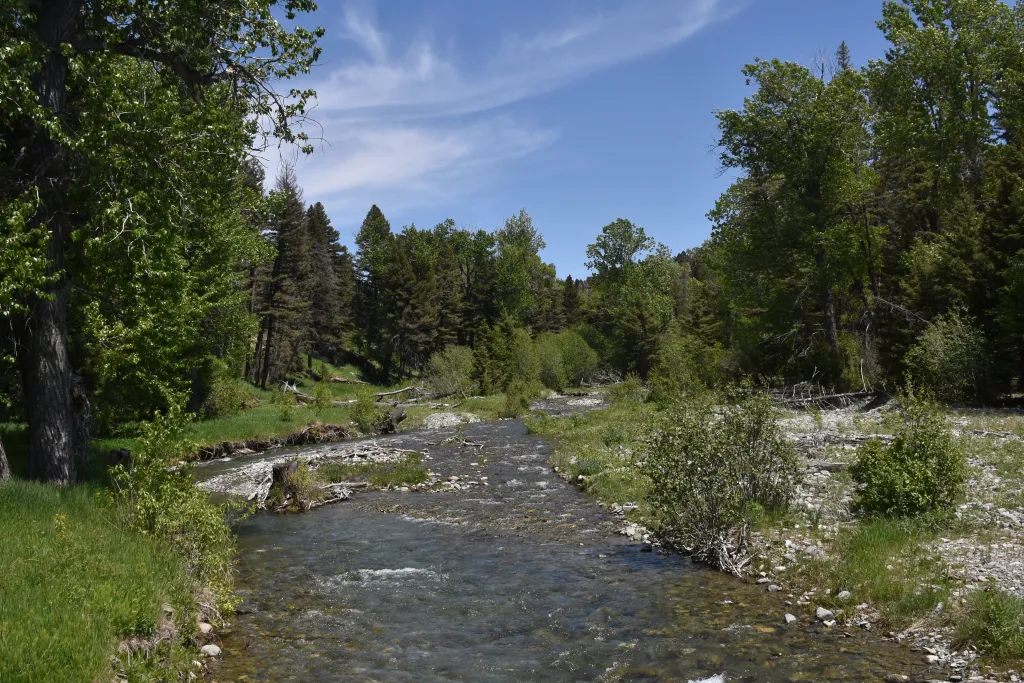
Coppes, who clerked for recently retired Montana Water Court Judge Russ McElyea before going into private practice, can recall just two instances where DNRC has forcefully exercised its enforcement mandate. Both, it so happens, sprouted out of challenges posed by growth in the greater Bozeman area, which is just an hour’s drive from Clyde Park.
Coppes said those cases have demonstrated that it can be helpful for a county attorney to step in and lean on DNRC for stronger enforcement — something Sundling said he’d like to see. Park County District Attorney Chad Glenn wrote to MTFP in a June 13 email that his office is aware of the golf course irrigation dispute but has not been asked to provide legal advice or representation.
From a policy perspective, Coppes argues that the state government is still behaving as if Montana’s water resources are unlimited, and that’s no longer the case. Asked to respond to requests that the agency use a heavier hand with enforcement, Davin wrote that DNRC “takes its responsibilities with water rights seriously.”
But Coppes said that does not square with what he’s seeing.
“It’s not the old West anymore. There’s too much demand for water and there’s not enough of it. And that’s where DNRC comes in. DNRC is the only branch of the government that presumably has the authority to regulate all of this illegal activity on a large, state-wide scale,” he said. “And they absolutely refuse to do it.”
FEAR FOR THE LAND
On a recent drive through Shields Valley, with bits of cottonwood seeds floating down onto the windshield of her truck, Livingston resident Keegan Nashan described her efforts to learn about Crazy Mountain Ranch’s future. A community organizer and self-described “snoopy bitch,” Nashan has taken it upon herself to research both water- and non-water-related aspects of the ranch’s development plans so she can share it with locals. Her work, she says, is motivated by fear.
“My fear is that the culture of the Shields Valley, which I desperately adore, would be drastically changed,” Nashan said. “If they eat the Shields Valley the way they ate Big Sky, I don’t think I would be able to live with myself unless I did everything I [could] to make sure some of that culture was retained.”

Keegan Nashan of Livingston has been working to educate other Park County residents about the future of Crazy Mountain Ranch. Credit: Amanda Eggert / MTFP
The initial phases of Nashan’s efforts were diligent but affable. She called state and county agencies for information on the ranch’s wastewater permits, researched the lobbyists the company hired to ply lawmakers for changes to water leasing laws, and cold-called some of the property’s development masterminds. At one point, she even phoned CrossHarbor Capital Partner’s headquarters in Boston hoping to speak with company co-founder Sam Byrne, the “deal junkie” with a preference for complicated transactions who’s behind the multi-billion-dollar real estate enterprise that includes the Yellowstone Club, Moonlight Basin, Spanish Peaks — and now Crazy Mountain Ranch.
Nashan is familiar with CrossHarbor’s other exclusive resort properties, having visited them on catering gigs (“I wash other people’s dishes,” she says). She is adamant that the self-contained, privately managed services and infrastructure on display in Big Sky are not what she wants for her community. So she’s started putting her research to work, surfacing her findings and concerns at county commission meetings, planning board discussions and legislative hearings.
Her discovery on a warm June day of new roads carved into Crazy Mountain Ranch and excavators busy at work on new construction projects — likely the nine cabins and clubhouse the company received Department of Environmental Quality’s wastewater permits to build in 2023 — sent her into a ruminative slump. When she encountered a small fire engine emblazoned with “Crazy Mountain Ranch,” Nashan parked her truck, waved and walked over to ask its operators about it.
Back inside her truck, the Crazies visible in one window and the Bridger range competing for attention outside the other, Nashan explained her disappointment at stumbling upon the fire engine. “It makes me nervous because then there is no inter-reliance on the community,” she said. “The rich people get to divorce themselves from our public services and our public systems.”
In 2021, a subsidiary of the company that owns the Yellowstone Club purchased Crazy Mountain Ranch, an 18,000-acre guest ranch located in the Shields River Valley of Park County. Credit: Amanda Eggert / MTFP
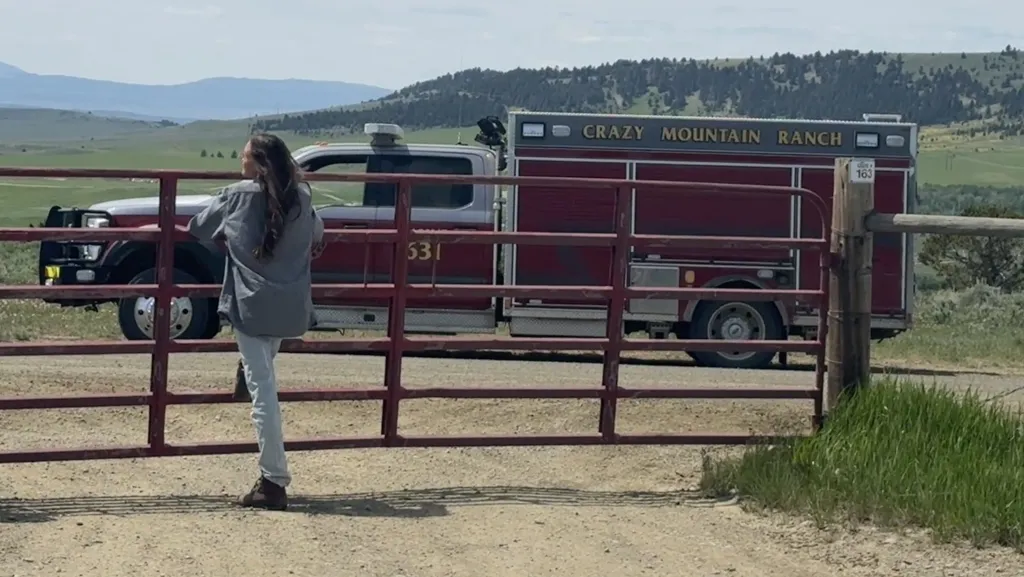
Nashan, who grew up in Livingston and studied human migration while earning a political science degree from the University of Montana in Missoula, doesn’t begrudge others for falling in love with the landscape that she also loves. But she does, she said, want them to respect the land and the people who make a home — and a living — on it. Shields Valley landowners don’t view their property as merely a place to park capital and maximize profits, she said. For them, their property isn’t one of many financial investments. For them, “this is their portfolio.”
Plus, it’s generally known that “you don’t f— around with water up the Shields Valley,” Nashan said. “Less than a decade ago, one rancher hit another rancher with a shovel in the middle of a field over water … I think [Crazy Mountain Ranch] is engaging as if it’s Big Sky. And it’s not.”
THE COMING ‘SHAKEDOWN’
Rich Sarrazin remembers that fight, too. A deputized, boots-on-the-ground official sometimes referred to as a ditch rider, for 20 years Serrazin has been charged with ensuring water is properly allocated during lean summer months.
To do that, he references a list of water rights with flow volumes and priority dates, monitors streamflows and ditch levels, documents use, adjusts head gates and consults a judge for input and enforcement direction on stickier matters. This year he’s been assigned a new one, District Court Judge Adam Larsen out of Roundup. Sarrazin has been chatting with Larsen to get him up to speed on the basin generally and the golf course issue in particular.
Barring the occasional local dustup, “we’ve always come out of it pretty clean,” said Sarrazin, who picks up wintertime work appearing as Santa at local Christmas events. “But now you really got to stay on your toes — write everything down, take pictures.”

Rich Sarrazin has been adjudicating water-related disputes in central Montana for 20 years as a water commissioner. He has been communicating with a district court judge based in Roundup for guidance on the complexities the 2025 irrigation season is presenting. Credit: Amanda Eggert / MTFP
Typically, Sarrazin starts making the rounds on rivers and creeks he’s assigned to sometime in July. This year, he anticipates he may be starting a little earlier. Among other things, Sarrazin said he’ll be ensuring that Crazy Mountain Ranch isn’t pulling water out of Rainbow Lake, a fish pond that it has been using as a temporary storage reservoir for the Rock Creek and Rock Lake water it’s been using to irrigate its partially constructed golf course.
“Everything will be shut down going to Rainbow Lake and it’ll all be shut down going to the golf course for the remainder of the summer,” he told MTFP on June 10. “That’s my job. I gotta do the dirty work. … It’s not going to be easy, but they’re going to have to follow it. Otherwise I can get law enforcement involved and we can settle issues that way.”
“It’s going to be a shakedown this year,” he added. “So everybody better get on board that’s gonna get on board.”
See more at Montana Free Press.

